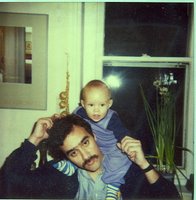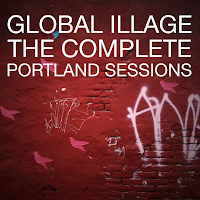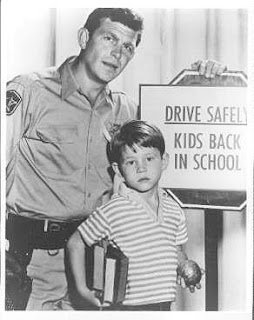The Adoption Option: Teen Pregnancy in America
 |
| The author with his first son in 1988. |
This blog, The Formality of Occurrence, began as a series of episodes that became the story of how I found my birthmother. I was adopted in 1958. My birth parents were both teenagers living in a small city in Indiana. My particular story was driven as well by the desire to understand my biological roots for my three sons beginning in 1988. I'd grown up with dark features and skin the color of creamed coffee. It was important to me to understand the story of my origin because the older I got the more I felt somehow cut off from all of society with no idea where I came from and what my beginning was in the story of my life. I didn't want my sons to even remotely feel that way.
I found my birthmother (the story will be out as a book sometime within the next two years) and I now know that I am mixed race. My birthmother and I are very close. I am close as well to her husband and my three half-brothers. I'm proud to claim two quite separate lineages in the tree of life. And I'm proud as well to be adopted in this world. The adopted are special people. We spend our lives feeling separate and different, but we also spend our lives reaching out to everyone who will let us, embracing and loving, always knowing how precarious and risky life is. We know deep down inside how chance and luck play in to all human interaction. There are some of us who struggle with this weird situation we were born into. Some of us have anger. Some find it hard to trust others. I think it's fairly likely that all of us carry with us a very powerful fear of rejection. I know for me, it wasn't until I found the love of my life (we have been married now for nearly 22 years) and had children that I was finally able to lay down this quiet though determined sense of loneliness and disconnectedness in the world. That is a good thing. But I have experienced at times in the past two decades the sense that I might lose my connection to my wife and to my sons. I am advanced in age at 54, but my fear of loss is still profound and very powerful.
But adoption is a good thing. I love my birthmother and my mother both. And I know that by adopting me my mother, Ellen Horgan Biddle, had her life changed forever. I know as well that adopting me allowed my birthmother to move forward with her young life and become the successful woman she became -- and the loving mother of three other boys, my half-brothers.
| Daniel Taylor Source: Phila Inquirer |
It is with this knowledge that I read a commentary piece today in The Philadelphia Inquirer on teen pregnancy. The article, called "Teen Pregnancy's High Cost," points out that the U.S. teen pregnancy rate has dipped by 40% since 1990, but it goes on to point out that minorities have the highest rates by far and that 7,000 girls under 15 had babies in 2008. Written by pediatrician, Daniel Taylor, the article also points to the health problems of babies born to teenagers. It also points to the cyclical problem of teens having children who go on to become teenage parents themselves.
We don't talk about this issue enough. In this election year where politicians act like they care about poor people and the disadvantaged, there's a lot of talk about welfare reform and modifying our health care system. But teen pregnancy has to be one of the single most obvious problems directly related to welfare, healthcare, education, and the health of "the family" in America.
We all know that "right to life" proponents are hostile to the idea of giving women the right to make choices about their bodies. We know as well that "pro choice" advocates are concerned about women's reproductive lives and often derisively at odds with right to lifers. The interesting thing is that those hostile to abortion are often strong advocates for adoption. But because in many states they have such a powerful connection to the adoption community, pro choicers have a hard time fully addressing that issue. The result all too often is that the question and issue of adoption is left out of the debate.
It is also left out of the article I site above. How many of the 367,752 live teen births annually in America (3,500 in Philadelphia alone) end in adoption? We don't know. The article doesn't deal with this issue at all. Why? Because according to the Gladney Center for Adoption less than 2% of young girls who have babies put them up for adoption. I went to the website of the National Campaign to Prevent Teen and Unplanned Pregnancy. As far as I can tell that website provides nothing substantive on adoption at all. Adoption is called the third option. It is also called the silenced option.
I don't like the idea of abortion, personally. I also don't like the idea that someone with a religious agenda and differing values can tell a woman (or a teenage girl) what to do with her body. But I also think that it's very clear that if we know that teen pregnancy is a major problem for low income and minority communities in America, we need to do something big to change that. I would like to see pro-choice and pro-life advocates get together and figure out how to make adoption a definitive and viable option for everyone. Such a partnership should be organized and managed by the NAACP and probably the National Council of La Raza since the Latino community is more affected by teen pregnancy than most minorities (read Taylor's article!).
Adoption is so important to this country's future. We all know that many young married couples who struggle with fertility invest dramatic sums of money in the fertility industry. Why is that? Partly because people think that having their own "flesh and blood" is somehow important. But also partly because adoption seems so daunting and bureaucratic. The number of available children for adoption is far outstripped already by the number of families on waiting lists.
This is a very sticky issue, I know. I am aware that I oversimplify here, but it's also quite clear that teen pregnancy can't simply be addressed by prevention campaigns and political rhetoric about the pros and cons of abortion rights. Adoption doesn't just give babies a better chance in life, it also clearly gives young girls (and boys) the opportunity to mature and pursue educations and careers -- and more normal family lives in the future. Adoption is very likely one of the most effective tools we have to stop the cycle of poverty.
The change I'm advocating here is not something that needs to happen off in a corner of urban America. We've been doing that for decades. Adoption needs to be culture-wide and upfront and in the center of things. I think every famous person who was adopted needs to make that public and a focal aspect of their identities. Maybe we should all wear turquoise ribbons on National Adoption Day (and maybe our adopting parents should wear bright blue).
Athletes, actors, and politicians need to go out of their way to support American adoption centers. The next versions of Madonna and Brangelina looking for babies should make a point of staying within our borders. And the media needs to start covering adoption as an option for teenage mothers in a positive and empowering way.
Don't kid yourself. There's still a stigma attached to adoption. It confuses people on all sides of the question. But I believe we're getting smarter and less judgmental by the day. What we need is a world where 15-year-old girls who have had their futures jeopardized by pregnancy can consider a humane and realistic opportunity for the babies they are responsible for. I know we can make that happen. It's too obvious and powerful a solution to just ignore or forget...or silence.



Comments
Post a Comment